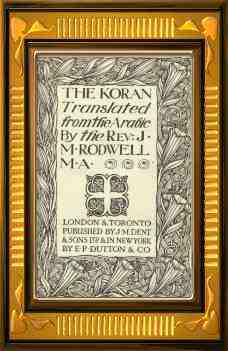The Least of These
"Verily God will say on the Day of Judgment, 'O children of Adam! I was sick and ye did not visit Me.'
And the sons of Adam will say, 'O our defender, how could we visit Thee? For Thou art the Lord of the
Universe, and art free from sickness.' And God will say, 'O men! such a one was sick and you did not visit
him.' And God will say, 'O children of Adam, I asked you for food, and ye gave it Me not?' And the children of Adam will
say, 'O our patron, how could we give Thee food, seeing Thou art the cherisher of the Universe, and art free from hunger
and eating?' And God will say, 'Such a one asked you for bread and you did not give it him.'"
(The Sayings of Mohammed, Allama Sir Abdullah Al-Mamun Al-Suhrawardy, 197.)
Who is the Speaker?: "Then the King will say to those on His right hand, 'Come, you blessed of My Father, inherit the kingdom
prepared for you from the foundation of the world: for I was hungry and you gave Me food; I was thirsty and you gave Me drink;
I was a stranger and you took Me in; I was naked and you clothed Me; I was sick and you visited Me; I was in prison and you came
to Me.' Then the righteous will answer Him, saying, "Lord, when did we see You hungry and feed You, or thirsty and give You
drink? When did we see You a stranger and take You in, or naked and clothe You? Or when did we see You sick, or in prison, and
come to You?" And the King will answer and say to them, "Assuredly, I say to you, inasmuch as you did it to one of the least of
these My brethren, you did it to Me." Then He will also say to those on the left hand, "Depart from Me, you cursed, into
the everlasting fire prepared for the devil and his angels: for I was hungry and you gave Me no food; I was thirsty and
you gave Me no drink; I was a stranger and you did not take Me in, naked and you did not clothe Me, sick and in prison and
you did not visit Me." Then they also will answer Him, saying, "Lord, when did we see You hungry or thirsty or a stranger or
naked or sick or in prison, and did not minister to You?" Then He will answer them, saying, "Assuredly, I say to you, inasmuch
as you did not do it to one of the least of these, you did not do it to Me." And these will go away into everlasting punishment,
but the righteous into eternal life.'" (Matthew 25:34-44).
Who is this King of Glory? "When the Son of Man comes in His glory, and all the holy angels with Him, then He will
sit on the throne of His glory. All the nations will be gathered before Him, and He will separate them one from another,
as a shepherd divides his sheep from the goats. And He will set the sheep on His right hand, but the goats on the left."
(Matthew 25:31-33).

The Doctrine of the Trinity
On October 31, 2010, gunmen broke into a Catholic church in Baghdad.
An organization called the "Islamic State of Iraq" immediately claimed
responsibility. They explained their actions as an attack on a "den of
polytheism." (Washington Post, '51 Iraqi worshipers, 7 troops killed in church siege,' November 1, 2010,
washingtonpost.com).
"They surely are Infidels who say, 'God is the third of three:' for there is no God but one God: and if
they refrain not from what they say, a grievous chastisement shall light on such of them as are
Infidels." (Sura 5:77)
Is this the doctrine of the Trinity: "God is the third of three"?:
Biblical Proof:

Mohammed was distressed by the multiplicity of sects. His solution was to start another one:
Dante's portrayal of Mohammed as a Christian schismatic goes back to those
Muslim writers who described him as a spiritual dilettante who, before
reciting the Koran, had tried all existing sects: "In his Al Kamil fi al Tarikh, ibn Kathir reported some of the current views
in answer to this question. Some claimed that Mohammed followed the law of Noah; others, the law of
Ibrahim; others, the law of Moses, others the law of Jesus. Others claimed
that Mohammed had followed every known law and observed it." (Muhammad
H. Haykal, The Life of Mohammed, p. 72). Mohammed was in contact with Christians;
his first wife's cousin Waraqah ibn Nawfal is said to have translated part of the New
Testament into Arabic (Haykal, p. 77): how competently is not stated. But describing Mohammed as a Christian
apostate, with these Muslim biographers, does not help his case: "But
even if we, or an angel from heaven, preach any other gospel to you than
what we have preached to you, let him be accursed." (Galatians 1:8).
Much of the material in the Koran is generally familiar to
the Christian reader, though not in the details. here did this
material come from?:
|


